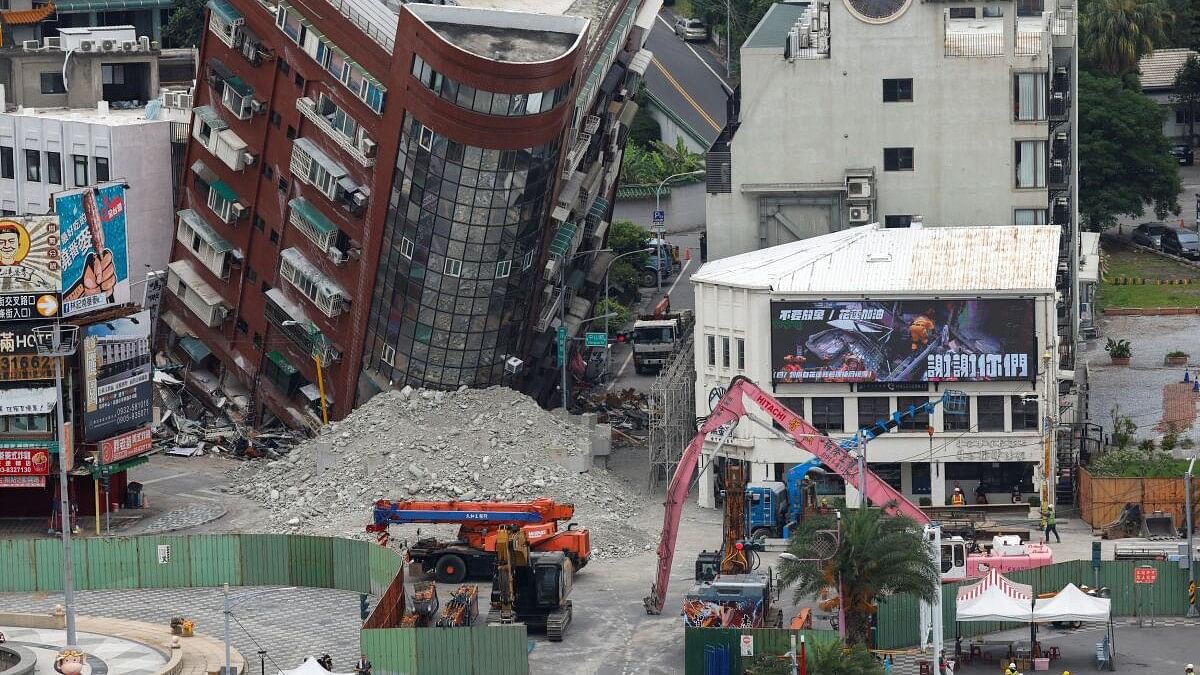
People take part in a ceremony ahead of the demolition of a damaged building, following the earthquake, in Hualien, Taiwan April 5, 2024.
Credit: Reuters Photo
Taiwanese rescuers looked for 18 people still missing on Friday after a 7.2 magnitude earthquake struck the island's mountainous and scenic east coast, as dozens of aftershocks rattled the disaster zone and those cut off were gradually taken to safety.
Wednesday's earthquake in Taiwan's sparsely populated eastern county of Hualien killed 10 people, leaving hundreds of people stranded in a national park as boulders barrelled down mountains, cutting off roads.
Taiwan's fire department put the number of people still missing at 18, including four foreigners previously listed as being Indian, Canadian and Australian whose location it said was unknown.
Another six people are missing on a hiking trail, and a 45-person rescue team is trying to reach them, it added.
Rescuers have confirmed that around 400 people cut off at a luxury hotel in the Taroko Gorge national park are safe, and has been helicoptering in supplies and taking out those injured.
"We're assessing the possibility of rain today, so our search and rescue colleagues will be equipped with rain gear. However, rain increases the risks of rockfalls and landslides, which are currently the biggest challenges we face," said Su Yu-ming, captain of the Kaohsiung city search and rescue team.
"These factors are unpredictable, which means we cannot confirm the number of days required for the search and rescue operations at this time."
A group of 50 workers who were on their way to the hotel and had been trapped on roads are now mostly safe.
"I am lucky to survive this disaster. We were terrified, especially when the earthquake first happened, we thought it was all over, all over, all over, because it was an earthquake, right?" said David Chen, 63, a security manager at the hotel, after he was rescued on Thursday.
"As we were leaving, rocks were still falling. We had to navigate through the gaps between the falling rocks, with the search and rescue team upfront," he added.
Chen's 85-year-old mother expressed her relief with tears streaming down her face as they were reunited. For some time, the family did not know if Chen had survived the disaster.
"I was happy to see him. I was happy when he returned. I didn't sleep at all last night and couldn't eat anything," his mother Chen Lan-chih said.
Around 50 aftershocks rattled Hualien overnight, some felt in the capital Taipei.
The earthquake happened the day before Taiwan begun a long weekend holiday for the traditional tomb sweeping festival, when Taiwanese head home to tend to ancestral graves. Many others go to tourist sites, like Hualien, a particularly popular destination given its rugged beauty.
But the earthquake has been a big blow to Hualien, with bookings cancelled, some business owners said.
"I think this is a disaster actually for us because no matter (if it is a) hotel, hostel, restaurants, tourism, (everything) really depends on it, the tourism," said hostel owner Aga Syu.
"In my mind I'm only concerned about our guests, that can they have a really good stay here. I hope this won't destroy their image of Hualien."
Taiwan lies near the junction of two tectonic plates and is prone to earthquakes.
More than 100 people were killed in a quake in southern Taiwan in 2016, while a 7.3 magnitude quake killed more than 2,000 people in 1999.